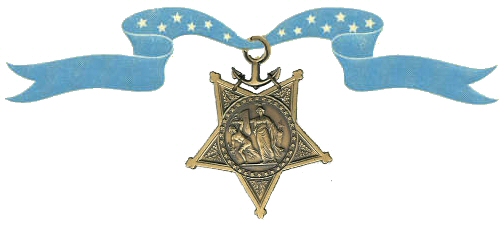John J. Powers Medal of Honor citation
The President of the United States in the name of The Congress takes pride in presenting the MEDAL OF HONOR posthumously to
LIEUTENANT
JOHN JAMES POWERS
UNITED STATES NAVY
for service as set forth in the following
CITATION:
The President of the United States of America, in the name of Congress, takes pride in presenting the Medal of Honor (Posthumously) to Lieutenant John James Powers (NSN: 0-74968), United States Navy, for distinguished and conspicuous gallantry and intrepidity at the risk of his life above and beyond the call of duty, while Pilot of an airplane of Bombing Squadron FIVE (VB-5) attached to the U.S.S. YORKTOWN (CV-5). Lieutenant Powers participated, with his squadron, in five engagements with Japanese forces in the Coral Sea area and adjacent waters during the period 4 to 8 May 1942. Three attacks were made on enemy objectives at or near Tulagi on 4 May. In these attacks he scored a direct hit which instantly demolished a large enemy gunboat or destroyer and is credited with two close misses, one of which severely damaged a large aircraft tender, the other damaging a 20,000-ton transport. He fearlessly strafed a gunboat, firing all his ammunition into it amid intense anti-aircraft fire. This gunboat was then observed to be leaving a heavy oil slick in its wake and later was seen beached on a nearby island. On 7 May, an attack was launched against an enemy airplane carrier and other units of the enemy’s invasion force. He fearlessly led his attack section of three Douglas Dauntless dive bombers, to attack the carrier. On this occasion he dived in the face of heavy anti-aircraft fire, to an altitude well below the safety altitude, at the risk of his life and almost certain damage to his own plane, in order that he might positively obtain a hit in a vital part of the ship, which would insure her complete destruction. This bomb hit was noted by many pilots and observers to cause a tremendous explosion engulfing the ship in a mass of flame, smoke, and debris. The ship sank soon after. That evening, in his capacity as Squadron Gunnery Officer, Lieutenant Powers gave a lecture to the squadron on point-of-aim and diving technique. During this discourse he advocated low release point in order to insure greater accuracy; yet he stressed the danger not only from enemy fire and the resultant low pull-out, but from own bomb blast and bomb fragments. Thus his low-dive bombing attacks were deliberate and premeditated, since he well knew and realized the dangers of such tactics, but went far beyond the call of duty in order to further the cause which he knew to be right. The next morning, 8 May, as the pilots of the attack group left the ready room to man planes, his indomitable spirit and leadership were well expressed in his own words, “Remember the folks back home are counting on us. I am going to get a hit if one have to lay it on their flight deck.” He led his section of dive bombers down to the target from an altitude of 18,000 feet, through a wall of bursting anti-aircraft shells and into the face of enemy fighter planes. Again, completely disregarding the safety altitude and without fear or concern for his safety, Lieutenant Powers courageously pressed home his attack, almost to the very deck of an enemy carrier and did not release his bomb until he was sure of a direct hit. He was last seen attempting recovery from his dive at the extremely low altitude of 200 feet, and amid a terrific barrage of shell and bomb fragments, smoke, flame and debris from the stricken vessel.
 Born: July 3, 1912 in New York City, N.Y…. Graduated U.S. Naval Academy, Class of 1935… Served aboard USS AUGUSTA and USS UTAH prior to attending flight school… Interred: body never recovered
Born: July 3, 1912 in New York City, N.Y…. Graduated U.S. Naval Academy, Class of 1935… Served aboard USS AUGUSTA and USS UTAH prior to attending flight school… Interred: body never recovered
